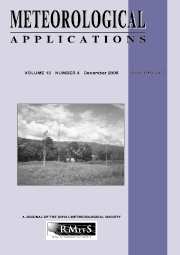Article contents
Atmospheric particulate transport modelling in acontrolled burn event
Published online by Cambridge University Press: 01 March 1998
Abstract
Smoke pollution from controlled burning of forested areas can be amajor problem for populated areas, even those at some distance fromthe site of the burning. In particular, Perth, the largest city inWestern Australia, is affected by smoke from controlled forest burnsto the south of the city when meteorological conditions advect smokeover the city. Such controlled burns are extensively carried out onan annual basis in spring, early summer and late autumn by theWestern Australian Department of Conservation and Land Management(CALM) in the southwest forests, in order to reduce flammable fuelsand mitigate the undesirable social, economic, environmental andhuman problems caused by destructive wildfires. In this article,results are presented from a mesoscale model prediction of smoketrajectories from a controlled burn event that took place inNovember, 1995. In this example, two meteorological factors, astrong sea-breeze front and a mesoscale low pressure system,unexpectedly turned the smoke back from its initial trajectory overthe ocean to directly over Perth itself. The result was very highsmoke concentration levels over the city and associated healthconcerns to residents as well as disruption to transport includingthe closing of Perth airport. The mesoscale guidance was veryaccurate and can provide valuable guidance when run routinely.
- Type
- Research Article
- Information
- Copyright
- © 1998 Meteorological Society
- 1
- Cited by


